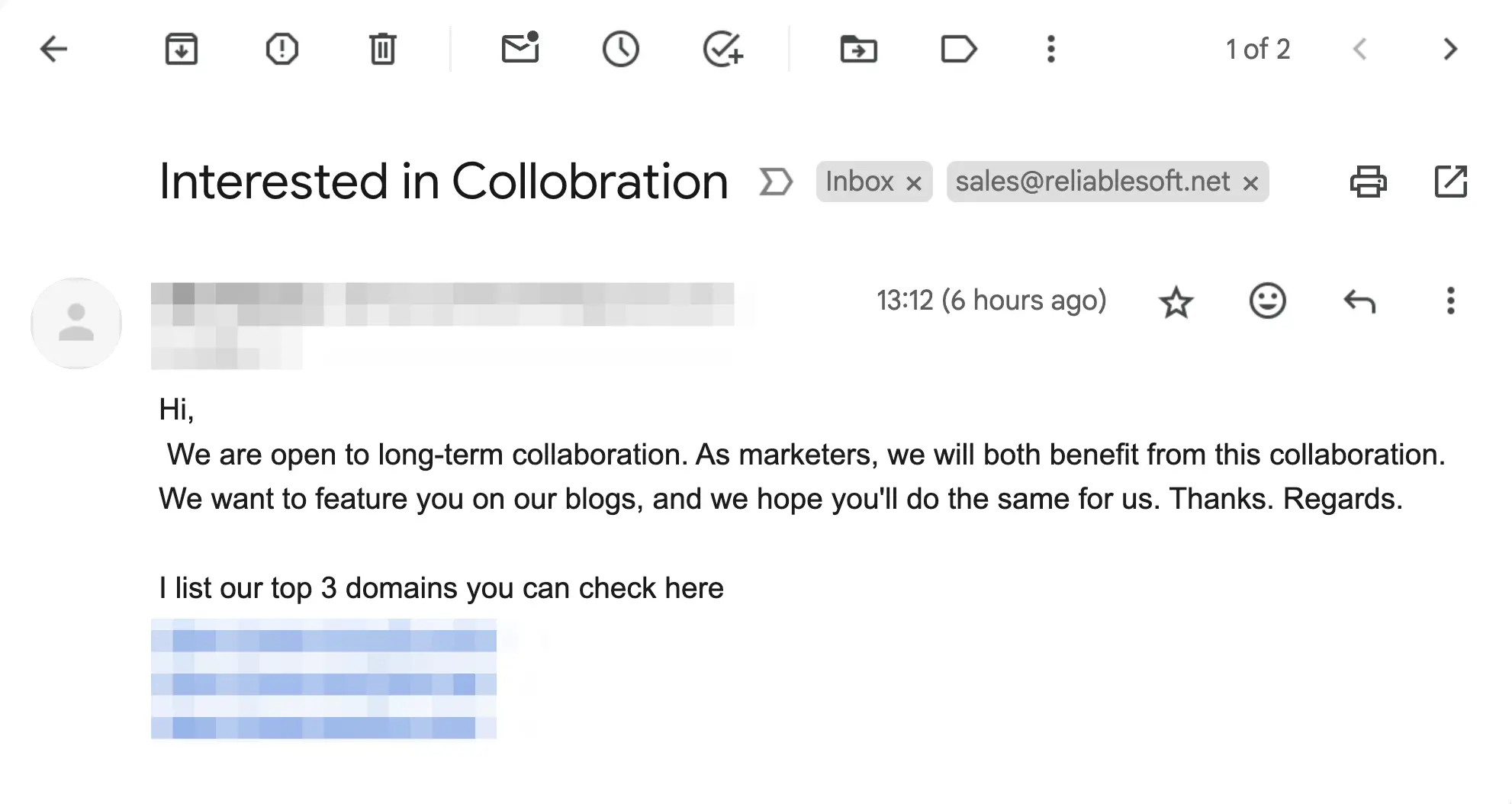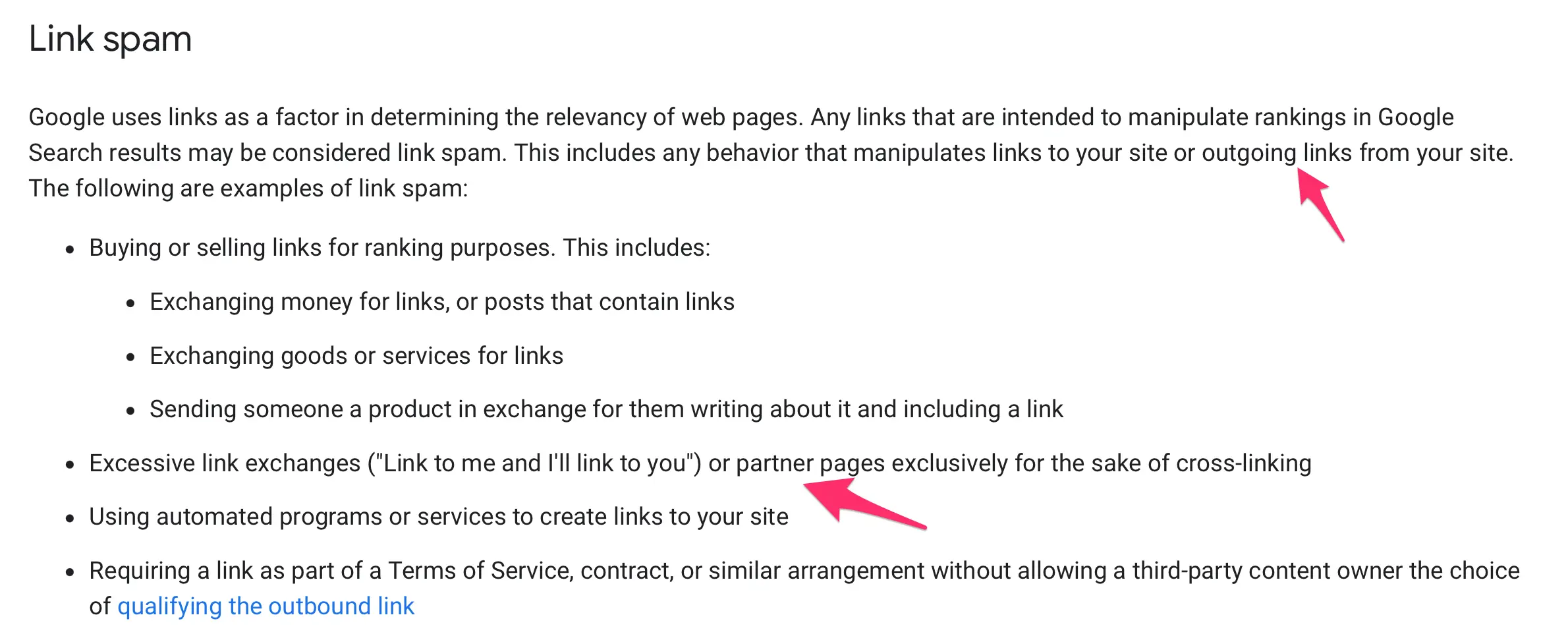If you ever received an email that looks like this but don't know what it is all about, you are in the right place.

Let's take it from the beginning, and by the end, you'll understand why your inbox is flooded with messages from people asking for a link exchange.
What Is Link Exchange?
Link exchange is a term used in SEO to describe an action where two websites agree to link to each other's content. It is also known as reciprocal link building, and the goal is to improve the organic rankings of the websites for particular keywords.
A link exchange can occur naturally or after an agreement.
Natural Link Exchange
A natural link exchange happens accidentally. It's when two websites link to each other without prior communication, often because they find each other's content valuable. In this case, neither website knows the other website has already linked to its content.
As a matter of fact, a recent study by Ahrefs showed that 40% of websites that rank in Google have reciprocal links.
Another type of link exchange is when a website links to another website after finding out about an incoming link without making a previous agreement.
Here is a common scenario that happens to me all the time. While checking my referral traffic in Google Analytics, I often see traffic from other websites because of a link they added that points to my content.
My first reaction is to check out their website, and if it's high-quality and relevant to my content, I might link to them in an upcoming article.
So, in essence, it's like doing a link exchange but without compensation or agreement.
Agreed Link Exchange
Besides natural link exchange, website owners may also intentionally link to each other. People in the SEO industry refer to this when they talk about link exchange.
It usually works through email. One website owner contacts another, suggesting they link to each other’s content. Typically, this email highlights the benefits of the link exchange and suggests where the links can be added.
One example is the email in the screenshot above, and another example is something like this:
I recently came across your article on [Topic], and I found it extremely valuable. I’ve written a piece on a similar topic, and I think our audiences would benefit from seeing both perspectives. Would you be open to a link exchange? Here’s the link to my article: [URL].
If you agree to the exchange, you'll link to their content, and they’ll do the same for you.
3-Way Link Exchange
Another type is a 3-way link exchange. In this scenario, three different websites are involved.
- Website A links to Website B
- Website C links to Website A
This method avoids direct reciprocal linking and makes the link exchange appear more natural to search engines.
Is Link Exchange Good Or Bad for SEO?
If you're a beginner reading this, it sounds like a win-win situation: You link to a website and get a link back, which can potentially help your SEO. What can possibly go wrong?
For starters, link exchange is considered link spam and is against Google guidelines. As stated by Google:
- Any attempt to manipulate links to your site or external links from your site.
- Exchanging posts that contain links.
- Excessive link exchanges or cross-linking.
- Buying links that don't carry the nofollow attribute.
These actions will lead to Google Penalties. This means you will lose your rankings and, more importantly, the ability of your website to rank in the future. In other words, if this happens, it is very bad for SEO.
Here is a screenshot of the relevant policies.

Other reasons you should avoid agreeing or even responding to link exchange emails include the following:
- Once you open a link-exchange email, your inbox will be flooded with similar emails. When you recognize from the subject line that the email is about a link exchange, don't open it and mark it as spam.
- People or companies that try to get links through link exchanges often add your link to low-quality websites full of external links that will have zero value for your SEO.
- For any backlinks to have value for your website, these need to be on websites with relevant content and pages that get traffic, and you won't find these sites in link exchange requests.
- As part of the agreement, you'll also have to link to unrelated websites that will negatively impact your SEO and damage your domain's reputation.
Long story short, avoid link exchange requests (including 3-way link exchange), even if they seem to be a good fit. These kind of link exchanges are easily traceable by search engines and bad for your user experience.
When Is Link Exchange Good For SEO?
Despite the bad reputation for the reasons explained above, link exchange can be good for your SEO strategy when done to provide real value to your users. Let's see some valid cases:
Link to valuable content: Adding an external link to your content because it's helpful for your users is not considered a link exchange, even if the other website links back to you as well.
For example, I added a link to an Ahrefs study in this post because it helped me prove a point. I know from doing a link profile analysis that Ahrefs has links pointing to my website. This is not considered a link exchange because both links were added naturally and provide additional context to the pages they are on.
Local businesses: It makes sense for local businesses to link to other businesses since they target the same market. For example, if you run a fitness studio, you can have a resource page on your website listing other companies in your area to help users find relevant services in your community.
Other local businesses may do the same. This is not considered a link exchange since the goal is not to trick search engines but to provide additional options to users. Some may argue that such links should be nofollow, which might be correct, but even if they are not, it won't cause any problems if done in moderation.
The bottom line:
Link exchange is a grey area in SEO. Some SEOs argue that it can help your SEO, provided that you are not caught by Google algorithms, while others suggest that you should stay away and focus on other link-building techniques.
The truth is somewhere in between.
As noted in the Google guidelines, excessive link exchanges should be avoided. However, this leaves the door open for link exchanges that happen naturally and for cases where they really benefit the users.
When you avoid link exchange requests and link out to high-quality websites only, you don't have to worry about link exchange damaging your SEO efforts.
Learn More About Link Building
Check out The Complete SEO Course to learn more about link building and other off-page SEO techniques to improve your Google rankings. This comprehensive course will teach you how to get links to your website without worrying about Google updates or penalties.




